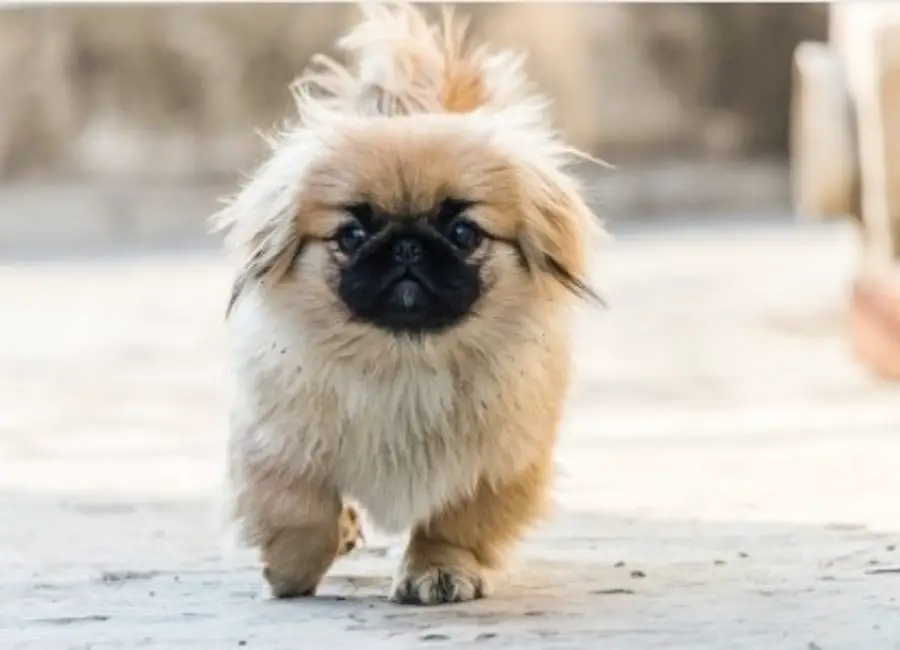12 Pekingese Pros And Cons You Should Know

Are you searching for Pekingese pros and cons? Then you are in the right post, this post will address your concerns about Pekingese pros and cons.
There are lots of pros and cons to owning a Pekingese, but we have summarized the most common ones in this post.
Pekingese dogs are known for their temperaments, intelligence, and love for people, keep reading to find out more about Pekingese.
Pekingese Pros And Cons
The Pekingese make great family pets, but they can be high-maintenance, they also require a lot of attention and can be stubborn.
Here are some common Pekingese pros and cons you should know:
1. Pekingese are affectionate and playful

Pekingese dogs can be very affectionate and playful. They are known for being very vocal and will often bark and howl.
They are also known for being very active, so it is important to provide them with enough exercise.
Pekingese show affection in the following ways:
- Barking – A dog will bark when it is happy, angry, or scared.
- Licking – A dog will lick you when it is happy, sad, or scared.
- Sitting close to you – A dog will sit close to you when it is happy, sad, or scared.
- Playing fetch – A dog will play fetch when it is happy, sad, or scared.
- Sleeping next to you – A dog will usually sleep next to you when it is happy, sad, or scared.
2. Pekingese can be difficult to train
The Pekingese can be difficult to train because of their independent nature
They are independent and willful dogs and require a lot of patience and consistency in training.
Pekingese also have a high energy level, so training them can be difficult if their daily routine is disrupted.
As with all dogs, obedience training and regular exercise are essential for a well-behaved Pekingese.
3. Pekingese can be high maintenance
They can be high maintenance, requiring a lot of attention and care due to their long coat.
Pekingese are relatively easy to care for, but they do require regular grooming.
Pekingese dogs can be high maintenance, as they require a lot of care and attention.
They are very active and require a lot of exercises, which can be difficult to provide in a city setting.
They also have a high energy level, so they require a lot of stimulation – both mentally and physically.
If you’re looking for a dog that’s easy to care for, the Pekingese may not be the best option.
4. Pekingese are not best for families with small children
They are not the best choice for families with small children because of their high energy.
Pekingese are known for their dignified, graceful appearance and are considered to be one of the most intelligent breeds of dogs. However, Pekingese do not do well with small children.
They are very active and playful, and may not be able to understand a child’s cries or movements.
If you have a Pekingese and you want to have children, you should take care to supervise them closely when they are around small children.
5. Pekingese are prone to separation anxiety
Pekingese are prone to separation anxiety. This is because they love being around people and are often very attached to their owners.
If your Pekingese is kept alone for too long, they may become agitated and start to cry.
If you’re going to be away from your Pekingese for an extended period of time, it’s important to prepare them in advance by teaching them how to cope with being left alone.
You can also try to keep them entertained by playing with them, giving them toys or treats, or letting them watch cartoons or movies.
6. Pekingese get along well with other pets
Pekingese get along famously with other pets but should be supervised when around other animals.
They are gentle and loving dogs but can be timid and anxious when first introduced to new animals.
7. Pekingese don’t do well in hot weather
Because they have trouble breathing and can’t effectively cool themselves in the heat, Pekingese are prone to respiratory problems.
Never leave your dog alone in a car because even with the windows up, it may get dangerously hot inside and be deadly for the animal.
They have lots of furs covering them, this can become an issue if you keep them in a hot environment.
8. Pekingese is a fragile dog
Pekingese dogs are one of the most popular toy breeds in the world.
They are considered to be one of the most fragile dog breeds and should be treated as such.
Pekingese dogs are susceptible to a number of health issues, and should not be taken on long walks or trips.
They are also prone to injury if they are not properly supervised.
9. Pekingese are suitable for small apartment
Pekingese is a breed of dog that is known for its curled tail and its unique features, such as its large ears.
This breed is often considered to be a toy dog, but it can be a good fit for a small apartment.
Pekingese are good for people who want a small dog that is gentle and playful.
However, Pekingese are good for people who want a small dog that is not hyperactive and does not require a lot of exercise.
10. Pekingese are picky in their choice of diet
Pekingese are known for being picky eaters, and their diet is no exception. They prefer a diet that is high in protein and low in carbs.
This means that they should not be fed a lot of treats or junk food, but rather a diet that is made up of healthy proteins and carbohydrates.
11. Pekingese require lots of grooming
Pekingese are one of the most popular dog breeds in the world and for good reason.
These dogs require a lot of grooming, and if you’re not careful, they can become quite frustrating to deal with.
First and foremost, the Pekingese requires a lot of attention to its coat.
This is a long, thick coat that needs to be brushed regularly and kept in good condition.
If left unkempt, the coat can become matted and difficult to manage. Additionally, the Pekingese needs to be kept clean.
This includes its ears, feet, and behind its tail, If these areas are not kept clean, some health issues may arise.
12. Pekingese have some health issues
Pekingese have a very long life span, averaging 10-12 years. However, like all dog breeds, they can suffer from certain health issues.
Some of the most common health problems seen in Pekingese include:
Lower respiratory health problems: Peke owners may experience difficulty breathing, especially if their dog is overweight or has respiratory problems such as asthma.
Eye health problems: Peke eyes may be prone to eye diseases such as glaucoma and cataracts, and surgery may be necessary to repair vision problems.
Teeth and gums health problems: Peke teeth and gums may be prone to decay and gum disease, which can lead to tooth loss.
Joint health problems: Pekingese joints may be prone to arthritis and other joint problems.
Skin health problems: Pekingese skin may be dry, oily, or have other problems.
Cancer: This is the main cause of death in Pekingese.
They are prone to developing cancerous tumors, typically around their mouths or noses.
It’s important to take your Pekingese to regular checkups, spaying or neutering them, and keep them up to date on their vaccines.
Heart disease: Pekingese are prone to developing heart disease, just like other dog breeds.
However, the condition is more common in Pekes than in other breeds.
You can help reduce your dog’s risk of heart disease by making sure they get regular exercise.
FAQs
What advantages do Pekingese owners enjoy?
Small, low-maintenance, affectionate, and suitable for apartment living.
What drawbacks come with having a Pekingese?
Possesses a stubborn nature, is prone to health problems, and has separation anxiety.
Do Pekingese get along well with kids?
If socialized correctly, they may be wonderful with kids, but because of their small stature, they are more prone to harm.
What kind of exercise should a Pekingese get?
They don’t need a lot of exercise, but going for frequent walks and playing inside helps keep them healthy.
The Pekingese sheds a lot, right?
They have a double coat that is thick and sheds sometimes.
Is it simple to train a Pekingese?
They might be resistant, but with time and encouragement, they can pick up simple instructions and tricks.
Conclusion
In conclusion, Pekingese are distinctive, devoted, and wonderful friends.
Their intellect and caring nature are only two of their many admirable traits, but they also have certain flaws that should be taken into account.
They may be a wonderful addition to any household with the right upbringing and instruction.
Prior to deciding whether a Pekingese is the correct breed for you, it’s crucial to weigh the benefits and drawbacks and make a well-informed choice.
